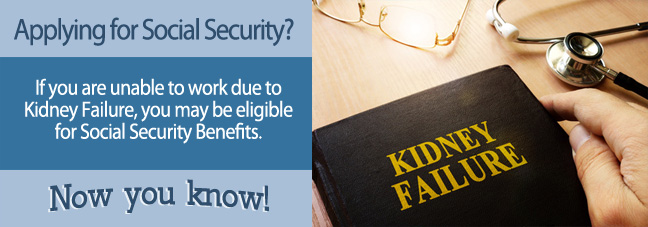Kidney failure, sometimes referred to as end-stage renal disease, affects an estimated 660,000 Americans. Kidney failure is the fifth, and final, stage of chronic kidney disease. Sadly, the only way to survive kidney failure is through the use of dialysis or a kidney transplant.
If you have been diagnosed with kidney failure, it is highly unlikely that you will be able to remain working. As such, you will likely be eligible for financial assistance through the Social Security Administration (SSA). The majority of individuals with kidney failure qualify for disability benefits as a result of the severity of their condition.
While most individuals with kidney failure will qualify for Social Security Disability Insurance (SSDI) benefits, older adults will have an even greater advantage. The SSA recognizes that advancing age is a limiting factor in an applicant’s ability to adjust or transition to a new job.
Qualifying for Disability Benefits for Kidney Failure Through the Blue Book
The easiest way to qualify for disability benefits for your kidney disease is by meeting a listing in the Social Security’s book of medical impairments, also called the Blue Book. An individual with kidney failure will likely meet several listings in the genitourinary section, 6.00, of the Blue Book.
To meet a Blue Book listing for Kidney Failure, one of the following conditions must be met:
- • You must be undergoing regular dialysis treatments
- • You must have completed a kidney transplant
- • You must have severely impaired kidney function as evidenced by several lab tests
- • You must have nephrotic syndrome
- • You must have serious complications from your kidney disease that have required at least three hospitalizations in the last year
Since kidney failure typically requires dialysis or a transplant for survival, the likelihood of meeting a Blue Book listing is quite high.
Grid Rules and Kidney Failure
If you have kidney failure and you do not meet a medical impairment listing in the Blue Book, the SSA will consider the effect of the disease on your working ability. In addition to your age, your examiner will take into account your education level, work history, and the skills you have acquired over the last 15 years.
To determine your physical capabilities, your claims examiner will perform a residual functional capacity (RFC) assessment. An RFC will assess your physical abilities and will issue you an exertional rating ranging from sedentary to heavy work. Your RFC classification will determine which “grid” is used to determine your disability status.
According to the grid rules, older individuals with less education and skills are more likely to qualify for disability benefits than younger, more educated people. For example, a 54-year-old female with kidney failure who has experience as a housekeeper is more likely to be approved for disability benefits than a 41-year-old college-educated architect.
What Type of Work Can Someone with Kidney Failure Do?
Kidney failure comes with a host of symptoms, including swelling of the legs and feet, nausea, shortness of breath, and exhaustion, just to name a few. As such, working can prove to be extremely difficult, if not impossible. Further, those individuals with kidney failure that receive dialysis must often adhere to a strict treatment schedule. It can be difficult to maintain employment for some individuals.
While working can be difficult with kidney failure, some people feel that it is important to maintain a sense of independence and normalcy. Individuals with kidney failure would benefit from a low-impact, mostly sedentary job in which one would be permitted to elevate their legs while working. For example, sorting mail might work for someone with kidney failure. Jobs that require excessive standing or physical exertion, such as in construction, would not be recommended.

Should I Discuss My Case with a Disability Lawyer or Advocate?
The majority of individuals with kidney failure will qualify for disability benefits through the Blue Book listing. However, this is not the case for everyone. If you do not meet a Blue Book listing, but you are over the age of 50, your chances of approval for disability benefits go up.
As you can see, the Social Security grid rules are complex. Hiring a qualified Disability Attorney or Advocate will likely be the best decision you can make during the application process. An experienced lawyer can help you navigate the Social Security Disability process, leaving you more time and energy to focus on your health.